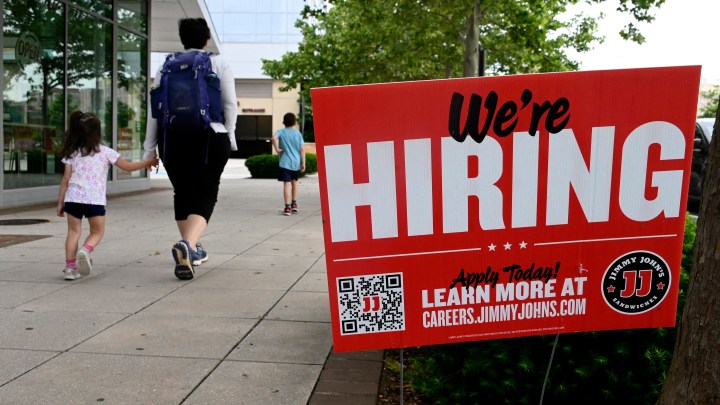
Despite the shaky economy, jobless claims are down. Here’s why.
Despite the shaky economy, jobless claims are down. Here’s why.

Another set of jobless claims data came out Thursday. The number of people filing for unemployment benefits last week fell to 193,000 — 16,000 fewer than the week before.
First-time unemployment claims usually represent layoffs. But it seems that despite a shaky economy, employers are holding on to their workers. When companies start whispering about layoffs, Jennifer Tierney at Tierney Recruiting Services is quick to notice because her business drops off. So far, that hasn’t happened. Employers in the industries she covers — hospitality, health care and higher education — “they’re still trying to catch up and they’re still trying to hire,” she said.
The worker shortage isn’t as dire as it was several months ago. Still, companies are just starting to claw their way back to pre-pandemic staffing.
At the height of the COVID shutdowns, 22 million people lost their jobs, and it took a lot of time and effort to rehire them once the country opened back up.
“Those laid-off people were not sitting by their phones waiting for them to be called back to work,” said Peter Cappelli, a management professor at Wharton. “They went on and did other things.”
Unfilled jobs led to closed dressing rooms at apparel retailers and roped-off dining rooms at fast-food joints. That meant companies left a lot of money on the table.
“After you’ve been through all this, to then turn around and say, ‘Oh wait, let’s let go of all these people’ is kind of a hard argument to make, at least now,” Cappelli said.
There are a few industries seeing layoffs, like construction and manufacturing, which are more directly affected by rising interest rates. But overall, businesses are not taking action, according to Julia Pollak, chief economist at ZipRecruiter. They’re on standby.
“They’re being very conservative. They’re only hiring needed staff. They’re not overhiring,” she said. “But they’re not pulling back just yet because they still are understaffed and are still seeing huge numbers of customers coming through the doors.”
Companies know they can lay people off if they have to. But during the pandemic, they’ve learned that it’s hard and expensive to hire — especially as wages rise. So until there’s a clear sign that the economy is in a tailspin, they’ll wait.
There’s a lot happening in the world. Through it all, Marketplace is here for you.
You rely on Marketplace to break down the world’s events and tell you how it affects you in a fact-based, approachable way. We rely on your financial support to keep making that possible.
Your donation today powers the independent journalism that you rely on. For just $5/month, you can help sustain Marketplace so we can keep reporting on the things that matter to you.

















